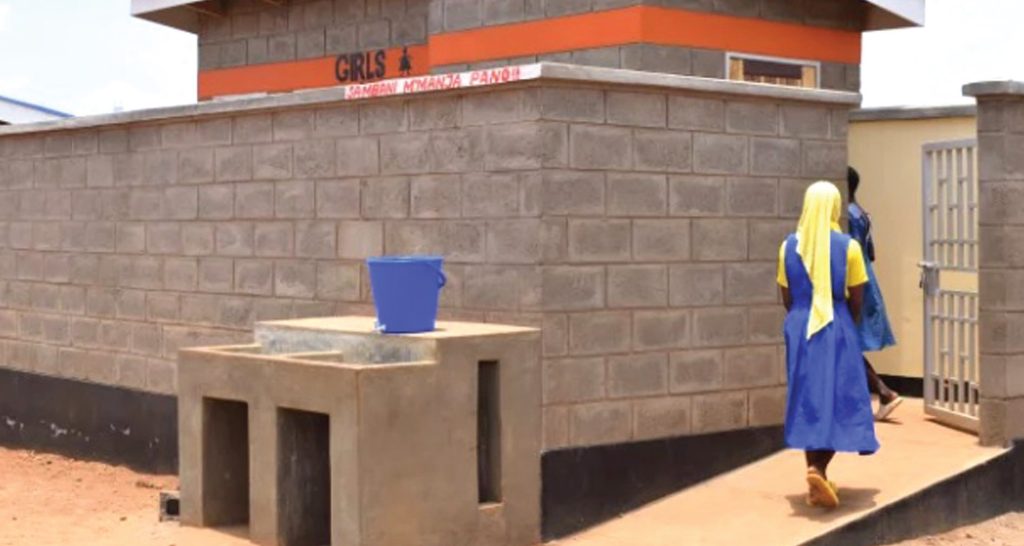In 2022, Chisiyo Primary School along the Western Bypass Road on the outskirts of Lilongwe City faced a water and sanitation crisis.
Water supply was erratic and attempts by the school management to drill a borehole were unsuccessful.
One of the sanitation facilities at Chisiyo Priamary School in Lilongwe
The toilets were not only unsanitary and dilapidated, but also insufficient for the approximately 4 500 learners at the school.
The threat of waterborne diseases, especially cholera, was huge, leaving the entire school vulnerable to illness.
Khadija Mponda recalls: “We used to go to surrounding houses or even to the nearby mosque to use the toilet.
“It wasn’t easy, especially for younger learners. Diarrhoea was a common problem, aggravated by the lack of running potable water and reliance on unsafe water sources nearby.”
The Standard Seven student was not eager to go to school and risk contracting waterborne diseases.
The Ministry of Health estimates that more than half of outpatients nationwide receive treatment for diseases that could be prevented through safe water, sanitation and hygiene (Wash).
According to WaterAid in Malawi, adequate Wash services remains a big challenge in most schools in the country.
The international non-governmental organisation reports that less than five percent of the schools provide handwashing facilities with soap.
Without Wash facilities in schools, children are more likely to get ill and miss out on education.
Malawi experienced its deadliest cholera outbreak from 2022 to 2023 which claimed 316 lives of the 10 823 patients in all the country’s 28 districts.
Trends of infection show the sanitation-related diarrheal disease was fuelled by poor food hygiene, unsafe water and open defaecation.
And then came the rainy season marked by the Tropical Storm Ana, which washed human waste from open grounds into rivers, streams and valleys, contaminating the water some Malawi use for drinking, cleaning utensils, laundry and other chores.
The cholera eruption that followed worsened the situation, putting more pressure to the health sector already strained by a high disease burden, high vacancy rates and low financing.
Chisiyo Primary School headteacher Patrick Kapalamula says they realised the gravity of the situation and attempts were made in haste to drill a borehole at the school.
“Since it did not materialise, the school was caught in a very dire situation,” he says.
To combat the cholera outbreak, the Lilongwe Water Board (LWB), with support from the World Bank, embarked on the Lilongwe Water and Sanitation Project (LWSP) to expand the much-needed water supply connections in the capital city’s southern zone.
Luckily, Chisiyo Primary School was among the public institutions that benefited from this project.
By the end of 2022, the water board’s pipeline had reached the school, offering a lifeline for the teachers, learners and surrounding community at risk of contracting the disease which kills within hours if not treated.
While installation was underway, the water board identified another problem: The school’s dilapidated and insufficient sanitation facilities.
By the end of 2023, LWSP had tremendously transformed the school’s access to water and sanitation. Four new blocks, which house eight toilets each for boys and girls, now stand as beacons of improved sanitation.
Kapalamula says: “The beauty of these toilets is that they are easy to empty and clean.
“With the old ones, we feared for the safety of our children, especially during the rainy season. We hope this availability of water, sanitation and hygiene facilities in schools will improve health, increase school attendance and lead to better learning outcomes.”
To make the positive change sustainable, each student contributes K100 to the water bills per term.
The collective effort keeps water supply uninterrupted for the well-being of all.
Through this initiative, over 25 000 learners from 12 primary schools are benefitting from improved water supply and better sanitation facilities in Lilongwe Urban.
In addition to responding to the deadliest cholera spate, LWB, through the project, provided clean water and improved sanitation facilities to other schools.
The projects also reached 13 600 people in peri-urban communities such as Nanjiri, Western Bypass, Mitengo and Zankutu in Lilongwe.
Through initiatives like extending water supply areas and constructing sanitation facilities, LWSP seeks to uplift the overall well-being of communities by ensuring sustainable access to potable water and proper sanitation.
The post Wash boost for urban schools first appeared on Nation Online.
The post Wash boost for urban schools appeared first on Nation Online.
 Moni Malawi
Moni Malawi 

